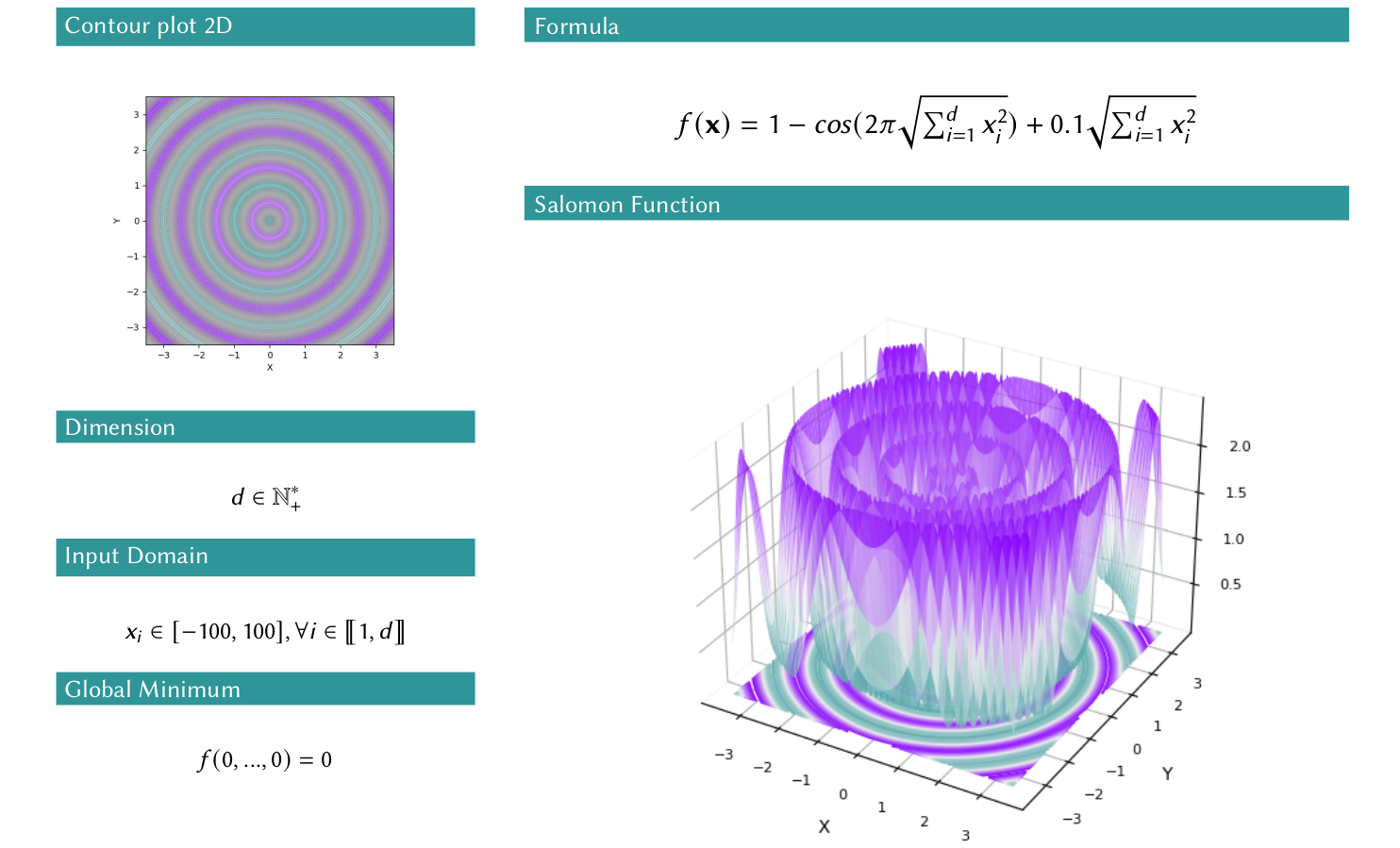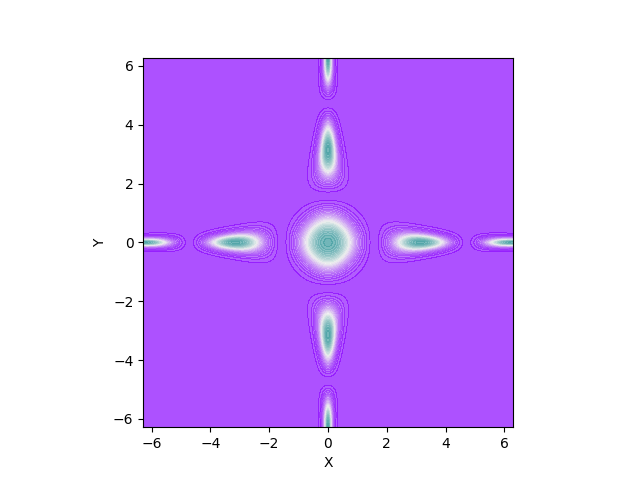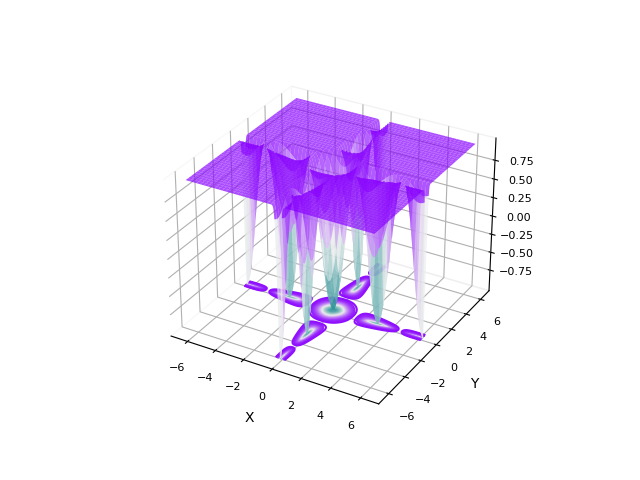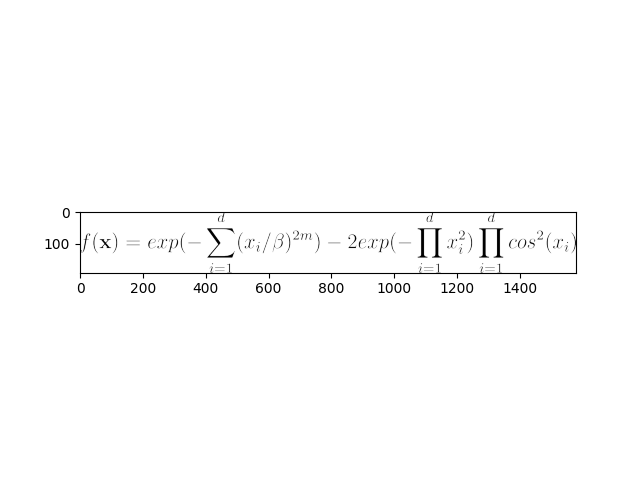Python_Benchmark_Test_Optimization_Function_Single_Objective
Here a repository where you can find and easy access python implementation of a benchmark of functions to challenge single objective optimizations. You can download or fork the repository freely. If you see a mistake you can send me a mail at axel.arcueil@gmail.com or contact me on LinkedIn.
Available functions documentation
You can find the full documentation on this article for all the functions as you can see on the image above.
Easy Use
One-liner access: Filter the functions with their characteristics
import pybenchfunction as bench
# get all the available functions accepting ANY dimension
any_dim_functions = bench.get_functions(None)
# get all the available continuous and non-convex functions accepting 2D
continous_nonconvex_2d_functions = bench.get_functions(
2, # dimension
continuous=True,
convex=False,
separable=None,
differentiable=None,
mutimodal=None,
randomized_term=None
)
print(len(any_dim_functions)) # --> 40
print(len(continous_nonconvex_2d_functions)) # --> 41Import specific function
# set the dimension of the input for the function
sphere = bench.function.Sphere(3)
# get results
X = np.array([1, 3, 0])
print(sphere(X)) # --> 10Plot 2d or plot 3d contours
# Warning ! Only working on 2d functions objects !
# Warning 2! change n_space to reduce the computing time
thevenot = bench.function.Thevenot(2)
bench.plot_2d(thevenot, n_space=1000, ax=None)
bench.plot_3d(thevenot, n_space=1000, ax=None)Access/change the parameters of parametrics functions
print(thevenot.get_param()) # --> {'m': 5, 'beta': 15}
thevenot.beta = 42
print(thevenot.get_param()) # --> {'m': 5, 'beta': 42}Get the global minimum for a specific dimension
X_min, minimum = sphere.get_global_minimum(3)
print(X_min) # --> [0 0 0]
print(minimum) # --> 0Acces/plot the latex formulas
latex = bench.function.Thevenot.latex_formula
# latex = bench.function.Thevenot.latex_formula_dimension
# latex = bench.function.Thevenot.latex_formula_input_domain
# latex = bench.function.Thevenot.latex_formula_global_minimum
print(latex) # --> f(\mathbf{x}) = exp(-\sum_{i=1}^{d}(x_i / \beta)^{2m}) - 2exp(-\prod_{i=1}^{d}x_i^2) \prod_{i=1}^{d}cos^ 2(x_i)
latex_img = bench.latex_img(latex)
# convert the latex formula to image
plt.imshow(latex_img)
plt.show()Uniform implementation
All the functions are Classes implemented in the same way. Here the Sphere example:
class Sphere:
name = 'Sphere'
latex_formula = r'f(\mathbf{x})=\sum_{i=1}^{d} x_i^{2}'
latex_formula_dimension = r'd \in \mathbb{N}_{+}^{*}'
latex_formula_input_domain = r'x_i \in [-5.12, 5.12], \forall i \in \llbracket 1, d\rrbracket'
latex_formula_global_minimum = r'f(0, ..., 0)=0'
continuous = True
convex = True
separable = True
differentiable = False
mutimodal = False
randomized_term = False
parametric = False
@classmethod
def is_dim_compatible(cls, d):
assert (d is None) or (isinstance(d, int) and (not d < 0)), "The dimension d must be None or a positive integer"
return (d is None) or (d > 0)
def __init__(self, d,):
self.d = d
self.input_domain = np.array([[-5.12, 5.12] for _ in range(d)])
def get_param(self):
return {}
def get_global_minimum(self, d):
X = np.array([0 for _ in range(d)])
return (X, self(X))
def __call__(self, X):
d = X.shape[0]
res = np.sum(X**2)
return res


